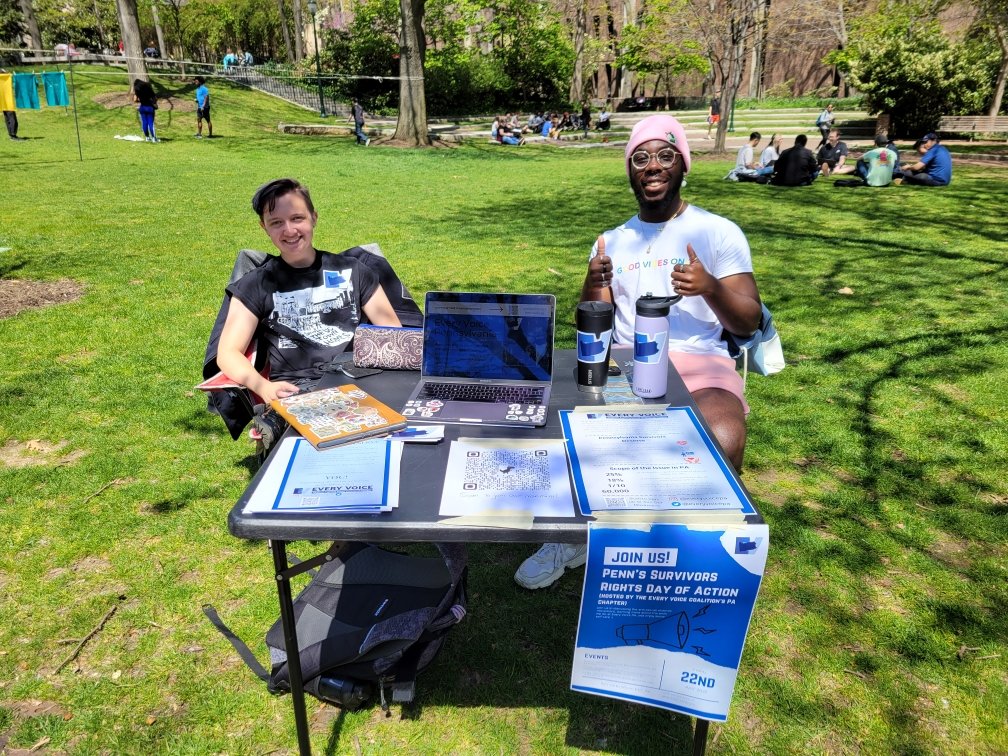A Call to Action from Every Voice Pennsylvania
(Adapted from testimony delivered on April 7, 2022, at the PA Democratic Policy Committee Hearing)
By Ari Fromm, Founder of Every Voice Pennsylvania
I came to The Every Voice Coalition out of personal necessity. It was the fall of 2020, and I was miserable. As a 21-year-old stuck inside during the pandemic, witnessing what felt like the world crumbling around me, I felt powerless. So many local, national, and global problems were swirling around me that I had little to no control over. So one day, I said to myself, “Enough is enough.” I was going to do something. I didn’t know what or how, but I was going to take my power back.
I took a leave of absence from college that semester and started applying to remote advocacy jobs. I found EVC online and joined their remote Development Fellowship. That’s where I first learned about college student organizing and legislative advocacy. Advocating for the rights and protections owed to me and my peers lit a fire under me that burned away the hopelessness I had been feeling. When the fellowship came to an end, I didn’t want to stop. So I decided to keep spending my free time fighting for survivors’ rights and forging a better reality.
Ari and their co-State Director Justin tabling on their campus during Sexual Assault Awareness month 2022.
I founded the Pennsylvania chapter of Every Voice and came on as State Director in January of 2021. I worked with the PA governor’s office and local partner organizations to write and introduce our first round of PA bills. I reached out to my peers, and pretty soon I’d built out a team of current PA students from across the state. Our members now span 12 campuses, public and private, rural and urban. Our Campus Leads are petitioning their universities to start making the policy changes we advocate for on the state level, and our Steering Committee works tirelessly every week to expand our reach, organize direct action, and keep pushing for our legislation. EVC PA’s students are a force to be reckoned with.
In the last year, in addition to drafting and introducing bills, my fellow Co-State Director Justin and I spoke at Governor Wolf’s press conference about the proposed legislation. We sent over 570 student-written letters to legislators urging action on these bills. We’ve partnered with statewide and local anti-sexual-violence organizations, and, for Sexual Assault Awareness Month, we organized a Survivors’ Rights Day of Action on campuses across the state.
Ari speaking at a Press Conference at the Pennsylvania Capitol in fall 2021.
But we shouldn’t have to be fighting this fight. The pain of campus sexual violence has gone on for far too long, so we students have taken on the burden of fighting it. That should not be our responsibility.
With an estimated 1 in 10 students experiencing sexual violence during their time in college, sexual violence will directly affect around 60,000 Pennsylvania college students in 2022. However, national statistics show that only around 5-10% of students who experience campus sexual violence report to official channels such as Title IX or Campus Law Enforcement. This number is shockingly low and shows a clear gap between what is happening on campuses and what is being reported by institutions.
Since so few students are comfortable reporting, we know that support resources need to be available to students regardless of their choice to report. However, as our system currently stands, with many university employees operating as mandatory reporters and with so much stigma around survivorship, many student survivors feel unsafe asking for any type of help. As a result, students end up falling through the cracks. National studies estimate that more than 40% of student survivors suffer from PTSD, and while PTSD is treatable, over a third of all student survivors are forced to take a leave of absence, transfer, or drop out. 10% leave school altogether. Student survivors need support. They need resources from their schools in order to heal and get back on track with their education. Existing resources for student survivors are few and far between, and those that do exist (like access to services as state Rape Crisis Centers) are often inaccessible. The cost of inaction on students is immense.
Our Solution
Luckily, there are concrete actions we can take, right now, to address campus sexual violence. First and foremost, in order to meet the needs of students, we need a better idea of what is going on in our state: All schools should be required to conduct climate surveys around campus sexual violence. Right now, universities are only required to publicly display data of reported crimes under the Clery Act. However, since only 5-10% of survivors report, the data schools are showing is massively unrepresentative. Penn State Main Campus, for example, reported 169 instances of sexual misconduct through the Clery Act in 2018 (which is 0.361% of the student population). According to their most recent voluntary campus climate survey, however, 1/4 of undergraduates in 2018 experienced some instance of sexual violence (which equates to about 11,422 people which means around 11,253 survivors were erased and silenced by current data reporting requirements on that campus alone).
Pennsylvania student leaders at the state’s capitol.
Penn State Main Campus is a unique example only because we actually have the relevant data. Most schools in Pennsylvania do not conduct campus climate surveys, so we have no idea just how large the discrepancy between reported and actual instances of sexual violence is. We need a statewide climate survey mandate to really know what is going on on campuses. We cannot begin to address sexual violence until we openly acknowledge the extent of the problem, and that begins with mandatory campus climate surveys.
Beyond climate surveys, Every Voice PA believes that institutions of higher education need to work to actively prevent campus sexual violence by educating students about the issue through annual mandatory trainings. In line with the current federal requirements, incoming students in PA receive one initial training into sexual violence and sexual violence prevention, but the training requirements are outdated and insufficient, and this training only happens when students first arrive on campus. For prevention trainings to actually work, we need to teach about consent, and we need to teach about it annually so that students internalize how to ask for and give consent.
In addition to meaningful prevention efforts, Every Voice PA believes student survivors deserve clear access to support resources. To do this, institutions of higher education should be required to collaborate with their local rape crisis centers. Many resources do exists for survivors at these centers, but too many students don’t know about them and/or are unable to get to rape crisis centers. All too often, student survivors are left on their own to figure out what they need, to help themselves heal through trauma while also managing their education and everything else that college entails. Requiring “memorandums of understanding” between schools and rape crisis centers is the first step to meaningfully supporting student survivors.
In addition to gaining access to off-campus resources, student survivors also need better support at their own institutions. While many schools provide some resources that can be helpful for survivors, navigating these resources ranges from complicated to virtually impossible, and with many employees being mandatory reporters, a survivor can feel unsafe confiding in people and asking for help. Therefore, every school should have a Confidential Resource Advisor (CRA) to help student survivors navigate their resources. CRAs are not therapists and would act separately from Title IX, although they could refer a survivor to both if needed. Their role would be to act as a safe and confidential advisor to students navigating a post-incident college experience, with confidentiality privilege under the law to ensure the survivor is able to confide in them without losing their agency or ability to control their story and next steps in any process.
Pennsylvania has the opportunity to step up and fill the gaps left in current school resources and prevention efforts. In these tumultuous and divided times, everyone can agree that sexual violence is harmful, and that students deserve to access their education safely. This is an issue we can all come together on. Pennsylvania can and should codify greater access to prevention, resources, and support, because students need change now.
Ari graduating from college!
Now, as I’m graduating and stepping out of my role as Co-State Director, I urge those in positions of power to think about who you are hearing from when you are drafting and passing legislation. Whose voices are you incorporating? Are you taking into account the needs and demands of those most affected? When it comes to campus sexual violence, are you and your colleagues listening to students? Because we’re here, we know what needs to change, and we’re speaking out.
I’m proud of what I’ve accomplished with Every Voice in the last two years. I’m beyond proud of everyone involved in Every Voice PA, and I know I’m passing this movement off into strong and capable hands. Our fight is far from over, but we’ve made it this far, and together we cannot be stopped.




